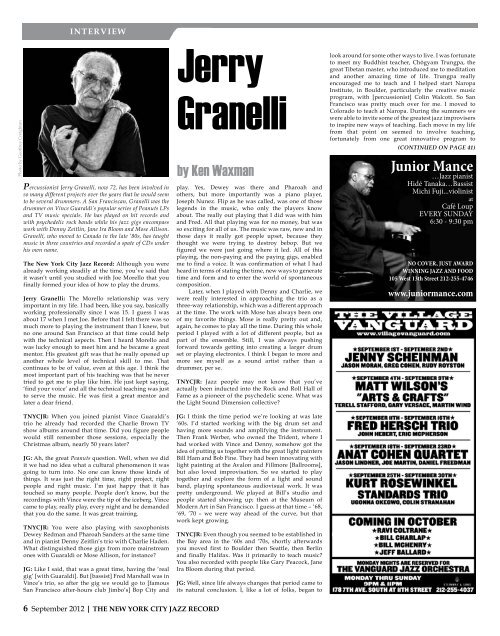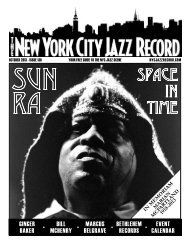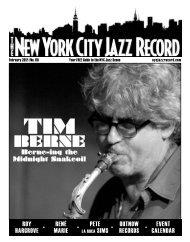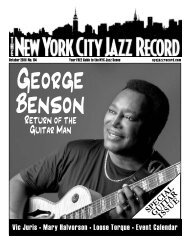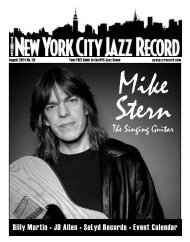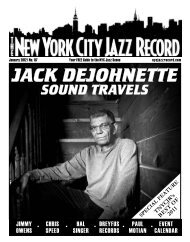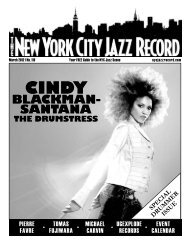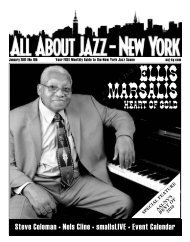September 2012 - The New York City Jazz Record
September 2012 - The New York City Jazz Record
September 2012 - The New York City Jazz Record
You also want an ePaper? Increase the reach of your titles
YUMPU automatically turns print PDFs into web optimized ePapers that Google loves.
Photo by Geoffrey Creighton<br />
INTERVIEW<br />
Percussionist Jerry Granelli, now 72, has been involved in<br />
so many different projects over the years that he would seem<br />
to be several drummers. A San Franciscan, Granelli was the<br />
drummer on Vince Guaraldi’s popular series of Peanuts LPs<br />
and TV music specials. He has played on hit records and<br />
with psychedelic rock bands while his jazz gigs encompass<br />
work with Denny Zeitlin, Jane Ira Bloom and Mose Allison.<br />
Granelli, who moved to Canada in the late ‘80s, has taught<br />
music in three countries and recorded a spate of CDs under<br />
his own name.<br />
<strong>The</strong> <strong>New</strong> <strong>York</strong> <strong>City</strong> <strong>Jazz</strong> <strong>Record</strong>: Although you were<br />
already working steadily at the time, you’ve said that<br />
it wasn’t until you studied with Joe Morello that you<br />
finally formed your idea of how to play the drums.<br />
Jerry Granelli: <strong>The</strong> Morello relationship was very<br />
important in my life. I had been, like you say, basically<br />
working professionally since I was 15. I guess I was<br />
about 17 when I met Joe. Before that I felt there was so<br />
much more to playing the instrument than I knew, but<br />
no one around San Francisco at that time could help<br />
with the technical aspects. <strong>The</strong>n I heard Morello and<br />
was lucky enough to meet him and he became a great<br />
mentor. His greatest gift was that he really opened up<br />
another whole level of technical skill to me. That<br />
continues to be of value, even at this age. I think the<br />
most important part of his teaching was that he never<br />
tried to get me to play like him. He just kept saying,<br />
‘find your voice’ and all the technical teaching was just<br />
to serve the music. He was first a great mentor and<br />
later a dear friend.<br />
TNYCJR: When you joined pianist Vince Guaraldi’s<br />
trio he already had recorded the Charlie Brown TV<br />
show albums around that time. Did you figure people<br />
would still remember those sessions, especially the<br />
Christmas album, nearly 50 years later?<br />
JG: Ah, the great Peanuts question. Well, when we did<br />
it we had no idea what a cultural phenomenon it was<br />
going to turn into. No one can know those kinds of<br />
things. It was just the right time, right project, right<br />
people and right music. I’m just happy that it has<br />
touched so many people. People don’t know, but the<br />
recordings with Vince were the tip of the iceberg. Vince<br />
came to play, really play, every night and he demanded<br />
that you do the same. It was great training.<br />
TNYCJR: You were also playing with saxophonists<br />
Dewey Redman and Pharoah Sanders at the same time<br />
and in pianist Denny Zeitlin’s trio with Charlie Haden.<br />
What distinguished those gigs from more mainstream<br />
ones with Guaraldi or Mose Allison, for instance?<br />
JG: Like I said, that was a great time, having the ‘real<br />
gig’ [with Guaraldi]. But [bassist] Fred Marshall was in<br />
Vince’s trio, so after the gig we would go to [famous<br />
San Francisco after-hours club Jimbo’s] Bop <strong>City</strong> and<br />
Jerry<br />
Granelli<br />
by Ken Waxman<br />
6 <strong>September</strong> <strong>2012</strong> | THE NEW YORK CITY JAZZ RECORD<br />
play. Yes, Dewey was there and Pharoah and<br />
others, but more importantly was a piano player,<br />
Joseph Nunez. Flip as he was called, was one of those<br />
legends in the music, who only the players know<br />
about. <strong>The</strong> really out playing that I did was with him<br />
and Fred. All that playing was for no money, but was<br />
so exciting for all of us. <strong>The</strong> music was raw, new and in<br />
those days it really got people upset, because they<br />
thought we were trying to destroy bebop. But we<br />
figured we were just going where it led. All of this<br />
playing, the non-paying and the paying gigs, enabled<br />
me to find a voice. It was confirmation of what I had<br />
heard in terms of stating the time, new ways to generate<br />
time and form and to enter the world of spontaneous<br />
composition.<br />
Later, when I played with Denny and Charlie, we<br />
were really interested in approaching the trio as a<br />
three-way relationship, which was a different approach<br />
at the time. <strong>The</strong> work with Mose has always been one<br />
of my favorite things. Mose is really pretty out and,<br />
again, he comes to play all the time. During this whole<br />
period I played with a lot of different people, but as<br />
part of the ensemble. Still, I was always pushing<br />
forward towards getting into creating a larger drum<br />
set or playing electronics. I think I began to more and<br />
more see myself as a sound artist rather than a<br />
drummer, per se.<br />
TNYCJR: <strong>Jazz</strong> people may not know that you’ve<br />
actually been inducted into the Rock and Roll Hall of<br />
Fame as a pioneer of the psychedelic scene. What was<br />
the Light Sound Dimension collective?<br />
JG: I think the time period we’re looking at was late<br />
‘60s. I’d started working with the big drum set and<br />
having more sounds and amplifying the instrument.<br />
<strong>The</strong>n Frank Werber, who owned the Trident, where I<br />
had worked with Vince and Denny, somehow got the<br />
idea of putting us together with the great light painters<br />
Bill Ham and Bob Fine. <strong>The</strong>y had been innovating with<br />
light painting at the Avalon and Fillmore [Ballrooms],<br />
but also loved improvisation. So we started to play<br />
together and explore the form of a light and sound<br />
band, playing spontaneous audiovisual work. It was<br />
pretty underground. We played at Bill’s studio and<br />
people started showing up; then at the Museum of<br />
Modern Art in San Francisco. I guess at that time – ‘68,<br />
‘69, ’70 – we were way ahead of the curve, but that<br />
work kept growing.<br />
TNYCJR: Even though you seemed to be established in<br />
the Bay area in the ‘60s and ‘70s, shortly afterwards<br />
you moved first to Boulder then Seattle, then Berlin<br />
and finally Halifax. Was it primarily to teach music?<br />
You also recorded with people like Gary Peacock, Jane<br />
Ira Bloom during that period.<br />
JG: Well, since life always changes that period came to<br />
its natural conclusion. I, like a lot of folks, began to<br />
look around for some other ways to live. I was fortunate<br />
to meet my Buddhist teacher, Chögyam Trungpa, the<br />
great Tibetan master, who introduced me to meditation<br />
and another amazing time of life. Trungpa really<br />
encouraged me to teach and I helped start Naropa<br />
Institute, in Boulder, particularly the creative music<br />
program, with [percussionist] Colin Walcott. So San<br />
Francisco was pretty much over for me. I moved to<br />
Colorado to teach at Naropa. During the summers we<br />
were able to invite some of the greatest jazz improvisers<br />
to inspire new ways of teaching. Each move in my life<br />
from that point on seemed to involve teaching,<br />
fortunately from one great innovative program to<br />
(CONTINUED ON PAGE 41)<br />
Junior Mance<br />
…<strong>Jazz</strong> pianist<br />
Hidé Tanaka…Bassist<br />
Michi Fuji...violinist<br />
at<br />
Café Loup<br />
EVERY SUNDAY<br />
6:30 - 9:30 pm<br />
NO COVER, JUST AWARD<br />
WINNING JAZZ AND FOOD<br />
105 West 13th Street 212-255-4746<br />
www.juniormance.com


